Related Research Articles

The Australia men's national rugby union team, nicknamed the Wallabies, is the representative men's national team in the sport of rugby union for the nation of Australia. The team first played at Sydney in 1899, winning their first test match against the touring British Isles team.
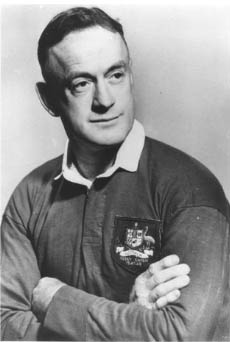
Cyril Towers was an Australian rugby union player, a state and national representative centre who made 57 appearances for the Wallabies, played in 19 Test matches and captained the national team on three occasions in 1937.
Kenneth William Catchpole was an Australian rugby union footballer. A state and national representative half-back, he played twenty-seven matches for Australia, thirteen as captain. Catchpole rose through the ranks at the Randwick club as a young man, before making his debut for New South Wales at only 19 years of age, then captaining Australia at age 21. He is considered one of Australia's greatest rugby scrumhalves.
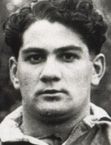
Sir Nicholas Michael Shehadie, was a Lord Mayor of Sydney (1973–1975) and national representative rugby union captain, who made thirty career test appearances for Australia between 1947 and 1958. He was President of the Australia Rugby Union from 1980 to 1987; in that role he pushed for and succeeded in persuading the International Rugby Board to launch the Rugby World Cup. He is an inductee into both the Australian Rugby Union Hall of Fame and the IRB Hall of Fame.
Richard Norman Thornett was one of five Australians to have represented their country in three sports. He was an Olympic water polo player before becoming a rugby league and rugby union player – a dual code international representative.
Trevor Allan was an Australian dual-code rugby international who captained Australia in rugby union before switching to rugby league with English club Leigh.
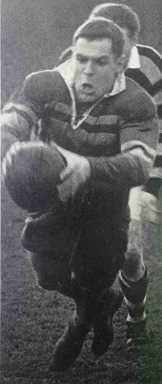
Ken Thornett, also known by the nickname of "The Mayor of Parramatta", was an Australian rugby league fullback. He represented the Kangaroos in twelve Tests during 1963 and 1964 and on the off-season Kangaroo Tour.

Arthur Cooper "Johnnie" Wallace was an Australian rugby union player, a state and national representative three-quarter who captained the Waratahs on 25 occasions in the 1920s as well as representing Scotland early in his career.
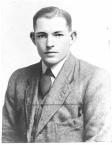
Tom Lawton Snr was an Australian rugby union player, a state and national representative five-eighth who made 44 appearances for the Wallabies, played in 14 Test matches and captained the national side on ten occasions.
Colin "Col" Windon, was a rugby union player and soldier who captained Australia – the Wallabies – in two Test matches in 1951. By age 18 Windon was playing at flanker for his club Randwick in Sydney's Shute Shield. After serving with the Second Australian Imperial Force in the Pacific Theatre during the Second World War, Windon resumed his rugby career in 1946. He was first selected for Australia for their tour of New Zealand that year. Despite the Wallabies losing both their Tests on tour, Windon impressed with his play.

Herbert John Solomon was an Australian rugby union player, a state and national representative versatile back who captained the Wallabies in eight Tests in the 1950s and led the touring squads to New Zealand and South Africa.

Anthony Alexander Shaw is an Australian former rugby union player. A Queensland state and national representative flanker, Shaw captained the national side consistently from 1978 to 1982.
Between October 1966 and March 1967 the Australia national rugby union team – the Wallabies – conducted a world tour on which they played five Tests and thirty-one minor tour matches. Under the captaincy of John Thornett they toured UK, Ireland, France and Canada winning nineteen matches, losing fourteen and drawing three. At one stage they failed to win in four successive matches although in the Test match against England they gave the home side its heaviest defeat in 16 years. The tour marked the climax of the successful "Thornett Era" of Australian Rugby, buoyed by the leadership skills of skipper John Thornett and the outstanding abilities of greats of the game like Ken Catchpole, Peter Johnson and Rob Heming. Dick Marks and Peter Crittle also toured and would later become among the most influential administrators of Australian rugby.
Alexander William Ross was an Australian state and national representative rugby union player who captained the Wallabies in thirteen Test matches in 1933-34.
Tony Miller MBE, (1929–88) was an Australian rugby union footballer and coach, A state and national representative second-row forward, he played forty-one Test matches for Australia in a representative career spanning sixteen seasons. His age at 38 years, 113 days at the time of his last Wallaby appearance stands as the Australian Test record for the oldest player. His club career spanned an extraordinary twenty-three years. He is an inductee to the Australian Rugby Union Hall of Fame.
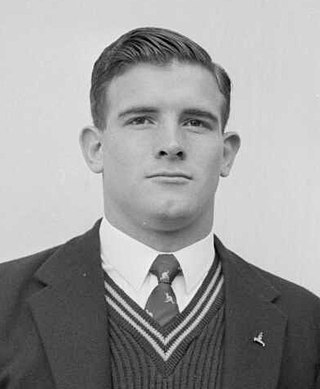
James Kenneth Michael Lenehan was an Australian rugby union footballer. A state and national representative versatile back, he played twenty-four Test matches for Australia, once as captain. His national representative career spanned a ten-year period during which time he made two grand Wallaby tours to the northern hemisphere and Home Nations and numerous appearances against New Zealand and South Africa.
Gregory Victor Davis was a New Zealand born, national representative rugby union player for Australia. He played at flanker and made seven international tours with Wallaby squads. He was the Australian national captain in 47 matches from 1969 to 1972 and led the Wallaby side on three overseas tours.

Peter George Johnson was an Australian international rugby union player. He enjoyed a long state and international career throughout the 1960s and made 92 national appearances for his country. He captained the Australian side in five Test matches.
Geoffrey Arnold Shaw is an Australian former national representative rugby union player who played for and captained the Wallabies. He made state representative appearances for both New South Wales and Queensland over an eleven-year period from 1969.
Richard James Pickett Marks is an Australian former rugby union footballer, noted rugby administrator and author. He played 17 Tests for Australia between 1962 and 1967, and was a captain of Queensland, for whom he played from 1962 to 1972. He served as national coaching director from 1974 to 1995, and was a leading figure in lifting the standard of Australian rugby. He also served on the Board of Queensland Rugby and was an inaugural member of rugby's International Technical Committee and drafter of the Game’s Charter. He received the Joe French Award for his contributions to Australian rugby in 2014, and remains active in debates on governance of Australian rugby. In 2020, he was inducted into the Queensland Sport Hall of Fame. In 2024, he was honoured with a Member of the Order of Australia award for significant service to rugby as a player, coach, and administrator. He is the grandfather of Queensland Reds player Curtis Browning.
References
- 1 2 3 4 5 Howell pp182-184
- 1 2 "Thornett, John Edward, MBE". It's an Honour. Archived from the original on 5 January 2019. Retrieved 23 December 2013.
- ↑ "2013 Inductee: John Thornett". World Rugby. Retrieved 4 January 2019.
- ↑ "Archived copy" (PDF). Archived (PDF) from the original on 19 March 2012. Retrieved 2 June 2012.
{{cite web}}: CS1 maint: archived copy as title (link) - ↑ New South Wales Amateur Water Polo Association Annual Reports for 1953/54, 1954/55, 1958/59 & 1959/60.
- ↑ "Rugby Union - ESPN Scrum - Statsguru - Player analysis - John Thornett - Test matches". ESPN scrum. Archived from the original on 26 October 2014. Retrieved 25 September 2014.
- ↑ Stats Guru Archived 26 October 2014 at the Wayback Machine .
- ↑ Archived article.
- ↑ United Kingdom list: "No. 43854". The London Gazette (Supplement). 31 December 1965. p. 23.
- ↑ "John Thornett". Sport Australia Hall of Fame. Archived from the original on 28 October 2020. Retrieved 25 September 2020.
- ↑ "Thornett, John: Australian Sports Medal". It's an Honour. Archived from the original on 5 January 2019. Retrieved 23 December 2013.
- 1 2 "Thornett, John ARU Hall of Fame". aru.rugby.com.au. Archived from the original on 4 March 2016. Retrieved 18 July 2011.
- ↑ "Legends inducted into IRB Hall of Fame" (Press release). International Rugby Board. 18 November 2013. Archived from the original on 3 December 2013. Retrieved 1 December 2013.
- ↑ Walton, Darren (4 January 2019). "Ex-Wallaby captain John Thornett dies". Illawarra Mercury. Retrieved 4 January 2019.